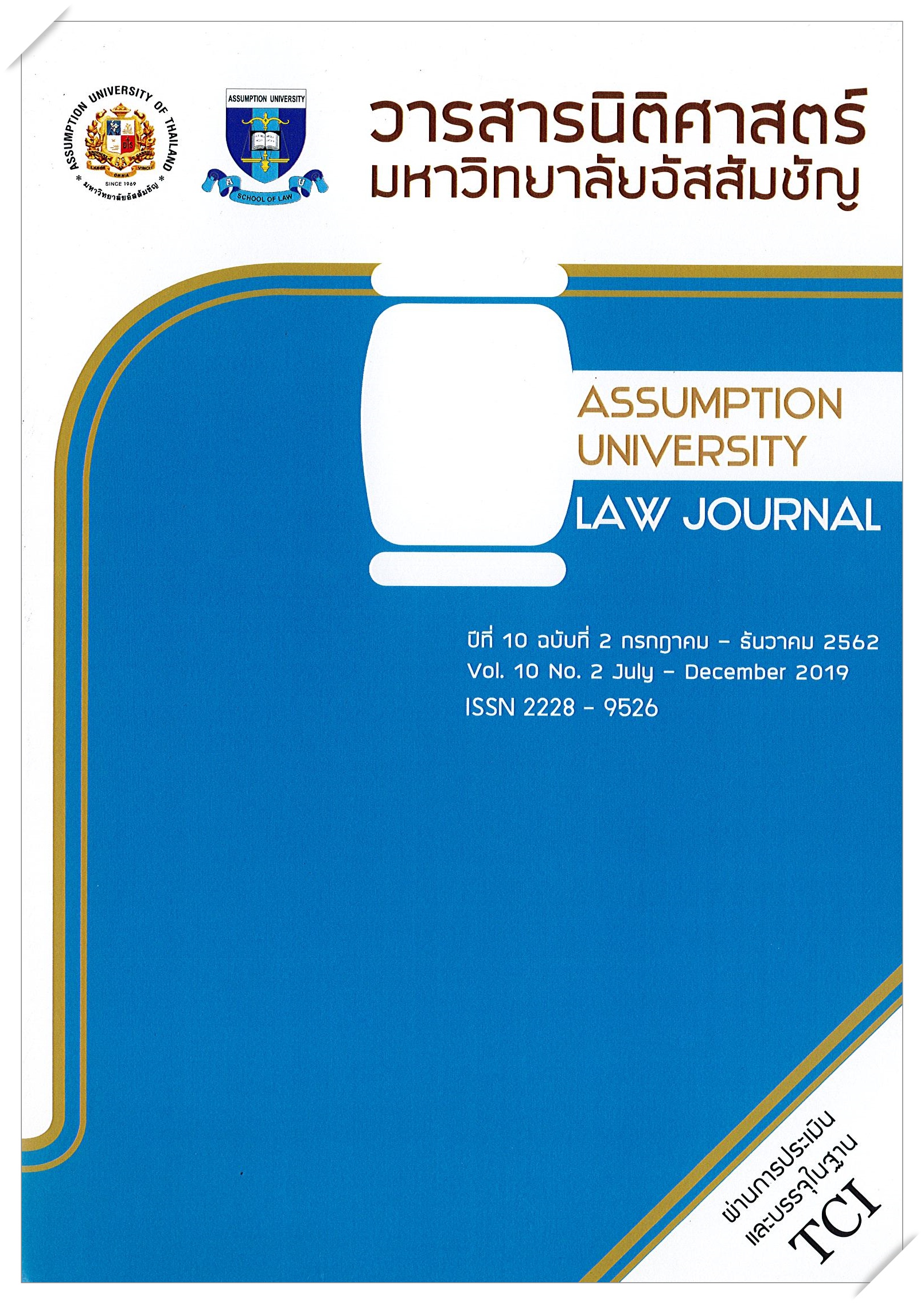ปัญหากฎหมายเกี่ยวกับค่าสินไหมทดแทนอันมิใช่ตัวเงินโดยเฉพาะค่าเสียหายทางจิตใจ: ศึกษาเปรียบเทียบกฎหมายลักษณะละเมิดของไทยกับประเทศสหรัฐอเมริกา<br>Legal Problems of Non-Pecuniary Compensation Especially Mental Damages: Comparative Study of Tort Law in Thailand and the USA
Keywords:
ค่าสินไหมทดแทน, ค่าเสียหายทางจิตใจ, ค่าเสียหายเชิงลงโทษ, กฎหมายลักษณะละเมิด, Compensation, Mental Damages, Punitive damages, Tort LawAbstract
บทคัดย่อ
บทความเรื่องนี้ มุ่งศึกษาถึงปัญหากฎหมายเกี่ยวกับค่าสินไหมทดแทนเพื่อการละเมิดสำหรับความเสียหายทางจิตใจของประเทศไทย โดยศึกษาเปรียบเทียบกับประเทศสหรัฐอเมริกา เพื่อทำให้ทราบถึงการเยียวยาผู้เสียหายเพื่อการละเมิดของประเทศสหรัฐอเมริกา เพื่อเป็นแนวทางที่เป็นประโยชน์ต่อประเทศไทยในอนาคต จากผลการศึกษาพบว่า ในประเทศไทยนั้น การเยียวยาผู้ที่ได้รับความเสียหาย ศาลไทยจะให้ผู้เสียหายสามารถใช้สิทธิเรียกร้องค่าสินไหมทดแทน เฉพาะกรณีที่ผู้เสียหายได้รับความเสียหายที่อาจคำนวณเป็นตัวเงินได้เท่านั้น โดยศาลจะเป็นผู้ใช้ดุลยพินิจในการกำหนดค่าสินไหมทดแทนเป็นกรณีๆ ไป ส่วนกรณีค่าเสียหายอันมิใช่ตัวเงินในประเด็นความเสียหายสำหรับจิตใจ เช่น ความวิปโยค ความว้าเหว่ ความชอกช้ำระกำใจ ความรื่นรมย์ในชีวิต ผู้เสียหายจะเรียกร้องได้ต่อเมื่อได้รับความเสียหายต่อร่างกาย อนามัย เสรีภาพ หรือหญิงที่ถูกกระทำผิดอาญาเป็นธุรศีลธรรมแก่ตนตามประมวลกฎหมายแพ่งและพาณิชย์มาตรา 446 แต่หากผู้เสียหายไม่ได้รับความเสียหายต่อร่างกาย อนามัย เสรีภาพ หรือเป็นหญิงที่ถูกกระทำผิดอาญาทุรศีลธรรม จะไม่สามารถเรียกร้องเอาค่าเสียหายทางจิตใจได้ ซึ่งแตกต่างจากหลักกฎหมายของประเทศสหรัฐอเมริกา ซึ่งได้มีการตัดสินไว้ในคดีต่างๆ ให้ผู้เสียหายสามารถเรียกค่าสินไหมทดแทนอันมิใช่ตัวเงินในส่วนของค่าเสียหายทางจิตใจได้อย่างกว้างขวางไว้อย่างชัดเจน ดังนี้แล้ว ผู้เขียนเห็นว่า ควรมีการแก้ไขเพิ่มเติมมาตรา 446 ในประเด็นการเรียกค่าสินไหมทดแทนกรณีค่าเสียหายทางจิตใจ โดยนำหลักการคาดเห็นและความเสียหายต้องไม่ไกลกว่าเหตุของระบบกฎหมายคอมมอนลอว์ ทั้งการนาหลักค่าเสียหายเชิงลงโทษของระบบกฎหมายคอมมอนลอว์มาบัญญัติไว้ในกฎหมายไทยอีกด้วย เพื่อให้ผู้กระทาละเมิดไม่หวนมากระทาผิดซ้า อีกทั้งยังเป็นการลงโทษให้ผู้กระทาละเมิดเข็ดหลาบและเป็นการเยียวยาผู้เสียหายให้ได้รับความเป็นธรรมจากการถูกกระทาละเมิดมากที่สุดเมื่อมีการแก้ไขมาตราดังกล่าว จะทาให้การเยียวยาผู้ได้รับความเสียหายครอบคลุมถึงค่าสินไหมทดแทนอันมิใช่ตัวเงินโดยเฉพาะค่าเสียหายทางจิตใจดังเช่นของต่างประเทศ ซึ่งส่งผลให้ผู้เสียหายได้รับการเยียวยาอย่างครอบคลุม
Abstract
This article focused on the study of the law regarding compensation for abuse for mental damage in Thailand by studying compare with the USA in order to be aware of the remedies for victims of abuse in the United States. Which is a useful approach to Thailand in the future.
From study found that in Thailand Remedies for those who have been damaged The Thai court will allow the victim to be able to claim compensation. Only in cases where the victim has suffered damage to pecuniary damage or loss. The court will use the discretion to determine the compensation on a case-by-case basis. In the case of non-monetary damages in the case of damage for the mind, such as tragic, loneliness, broken heart Pleasure in life. The injured person is unable to claim compensation only in cases where the victim has suffered damage to the body, health, freedom and women who have been convicted of criminal acts that Section 446. If the injured person does not receive damage to the body, health, freedom or is a woman who has been criminally abused, morality will unable to claim pecuniary damage or loss. Which is different from the US law which has been settled in various cases allowing the injured person to clearly call for compensation which is not a monetary part of the psychological damages. Therefore considered that Section 446 should be amended in respect of claims for damages for mental damages. By applying the expected principles and the damage must not be far beyond the cause of the common law system. And may apply the punitive damages principles of the Common Law system to apply to Thai law as well In order for the offender to not repeat the offense. It is also a punishment for those who violate Alcoa and it is a remedy for the victim to be fair from the abuse.
When such amendments will cause damage to the injured person, including non-monetary compensation, especially mental damages such as those of foreign countries. Which resulted in the victim be comprehensive remedies.
Downloads
Published
Issue
Section
License
- บทความทุกเรื่องได้รับการตรวจทางวิชาการโดยผู้ทรงคุณวุฒิ (Reader) จากภายในและนอกมหาวิทยาลัย
- ความคิดเห็นใดๆ ที่ลงตีพิมพ์ในวารสารกฎหมายคณะนิติศาสตร์ มหาวิทยาลัยอัสสัมชัญ เป็นของผู้เขียน (ความคิดเห็นใดๆ ของผู้เขียน กองบรรณาธิการวารสารกฎหมายคณะนิติศาสตร์ มหาวิทยาลัยอัสสัมชัญไม่จำเป็นต้องเห็นด้วย)
- กองบรรณาธิการวารสารกฎหมายคณะนิติศาสตร์ มหาวิทยาลัยอัสสัมชัญ ไม่สงวนสิทธิในการคัดลอก แต่ให้อ้างอิงแสดงแหล่งที่มาด้วย


